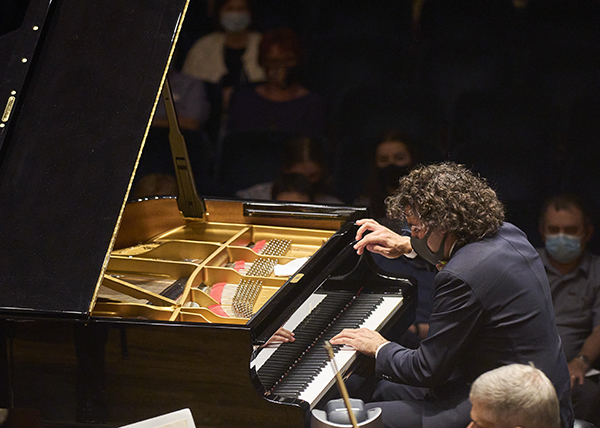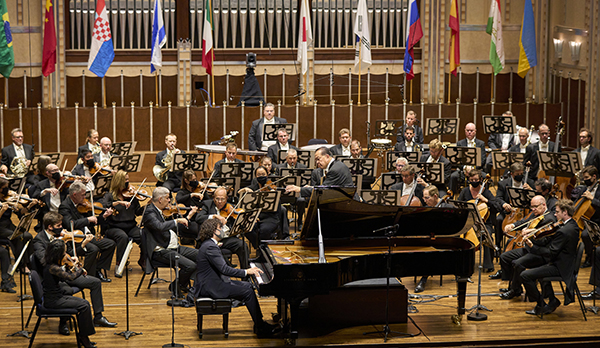by Mike Telin

On Sunday afternoon I was able to speak with the still slightly stunned García García over Zoom.
Mike Telin: Congratulations! You played beautifully.
Martín García García: Thank you so much. I still can’t believe it.
MT: When you finished, I remembered you telling me last week that playing Rachmaninoff 3 was like climbing a mountain. I thought wow, not only did he climb the mountain, he firmly planted the Spanish flag at the summit.
MGG: It was quite nice to come onstage and see all the flags at the back. And it was such a good feeling to see the flag of my own country.
MT: What did it feel like to look into the hall and see so many people?
MGG: Honestly, before playing, it’s a little bit like being in a cloud — I see and I don’t see. But afterwards the response from the audience was very heartfelt, so looking around at such a beautiful hall, everything was really magical.
MT: What was going through your mind when you realized you had won?
MGG: Honestly it was a little bit of a shock — it’s like something that isn’t real. But later in the night you start to realize that it did happen, and of course you become very happy.
MT: Everything went well during the rehearsal?
MGG: Let me trace my own steps back to yesterday. It was 65 minutes and I wanted to make everybody in the Orchestra feel as comfortable as possible, and myself too of course. You would always like to have more time to rehearse, but actually, it was surprisingly comfortable.
We played through the piece and when we finished there were a couple of spots to fix — which was quite strange, usually there are many more. But it was so comfortable with the Orchestra and Jahja Ling — who was so attentive.
MT: From what I heard and saw, the collaboration between you, Jahja, and the Orchestra seemed very natural. It was collaborative music-making.
MGG: Exactly. Sometimes, especially with a concerto this big, there is a feeling that the soloist is the soloist, and the orchestra is behind them. But this felt like the piano was inside the orchestra, so it is a real collaboration.
MT: I knew the performance would be good, but honestly, it exceeded my expectations.
MGG: (Laughs) I had the same feeling and I agree that exceeding expectations is a very nice experience.
MT: Did you get any sleep last night?
MGG: Everybody’s asking me that, and you know, I actually went to bed quite early because — how long have I been in Cleveland? Plus we made the First- and Second-Round recordings in April, so it has been quite a long competition.
You’re working toward the final concert, so after it is finished and the award ceremony is over, the heat of the moment just comes down on you.
MT: You not only won the Mixon First Prize, you were also awarded the Chamber Music Prize, the Piano Duo Prize (with Rafael Skorka) and — the Audience Prize. As we say, you really cleaned up.
MGG: I like that expression. But you know, from the time I arrived in Cleveland I could feel the warmth of the people. And after I played the Wanderer Fantasie in the Semifinals, people were very happy with the performance. They just kept clapping, which I have to say was a surprise because it is a difficult piece to listen to, especially if you’re hearing it for the first time. And after the concerto the reaction from the audience was the same — they just kept clapping. I am so grateful to every one of them and how they said thank you.

MGG: Yes, and I’m looking forward to getting to know the people who support the competition.
MT: You’re leaving Cleveland with a very large bank account. Have you had time to think about that?
MGG: Honestly I haven’t. But it is very important for an artist to have this kind of cushion behind them to help with travel tickets, lodging, everything. All artists, not just classical music artists, need to be supported. There is comfort in knowing that we are able to focus 100% on what we do. So that’s basically what I’m going to do with it — invest it in my own future.
MT: In addition to the cash, you will also get a New York recital debut, professional management services, and a recording by Steinway & Sons.
MGG: There are so many things that are going to happen, it’s hard to believe. But this is one of the major competitions. If you were to ask anybody in Madrid to name the biggest competitions in the world, Cleveland would be amongst them. So it has that name, not just for the prize, but for the support that they give to the artists. They manage to get them into so many big halls around the world. They have a long-reaching hand.
MT: I know this is premature, but is there something you’ve always wanted to record?
MGG: I’ve always wanted to give a new perspective to two composers who are very close to me and are very different from one another — Bach and Rachmaninoff.
With Rachmaninoff it’s the first sonata. It’s kind of hidden from the major classical repertoire, but like the Wanderer Fantasie it has been with me for many years. And from Bach, my main choices would be the first and sixth partitas.
MT: Is there anything you would like to say about Yaron Kohlberg and the Piano Cleveland staff?
MGG: They have made everything so seamless — every single one of them. You can’t believe how smoothly they have made the entire competition run. I can’t believe it because all of that work goes on behind closed doors.
And everybody has been so nice to me and to every one of the contestants. When talking with them everybody is so happy — no complaints.
With a major event to organize there is always something that goes wrong, and in this case I would say that nothing went wrong. So my praise to all of them.
Severance Hall photos by Roger Mastroianni courtesy of The Cleveland Orchestra. Informal snapshot by Mike Telin.
Published on ClevelandClassical.com August 11, 2021.
Click here for a printable copy of this article



